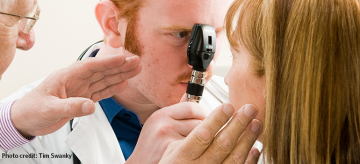By bkladko | April 28, 2016
Dr. Allard is the first full-time faculty member in 20 years to lead the Medical Alumni Association.
By jwong | April 28, 2016
Dr. Wong will offer strategic leadership, while creating and nurturing existing partnerships to help move the vision for the Faculty forward.
By kerry7 | April 26, 2016
Students from the Faculty of Medicine were part of the winning team at Hatching Health, an interdisciplinary medical innovation event.
By bkladko | April 18, 2016
The project is being led by Nadine Caron, an Associate Professor of Surgery based in Prince George.
By bkladko | April 15, 2016
The Hon. Harjit Sajjan, Minister of National Defence (centre) came to UBC to announce the grants, including one for Assistant Professor Janel Kopp (right).
By bkladko | April 14, 2016
Anthony Traboulsee is one of three faculty members giving plenary speeches to the American Academy of Neurology.
By bkladko | April 11, 2016
Megan Levings identified a genetic signature that measures changes in regulatory T-cells from a small blood sample.
By bkladko | April 7, 2016
A major focus of the gym will be exercise’s impact on people with cancer and other chronic diseases.
By bkladko | April 6, 2016
A widely available licensed pain medication is as effective as pharmaceutical-grade prescription heroin for people with chronic heroin addiction.
By kerry7 | April 5, 2016
How the arrival of family medicine residents on the east coast of Vancouver Island has helped transform a medical community.









